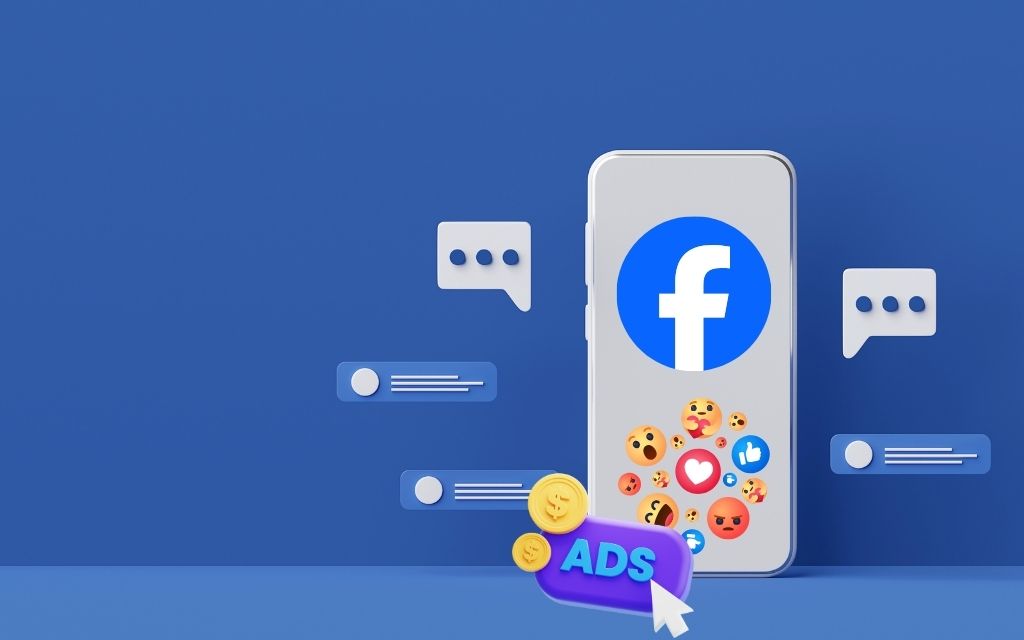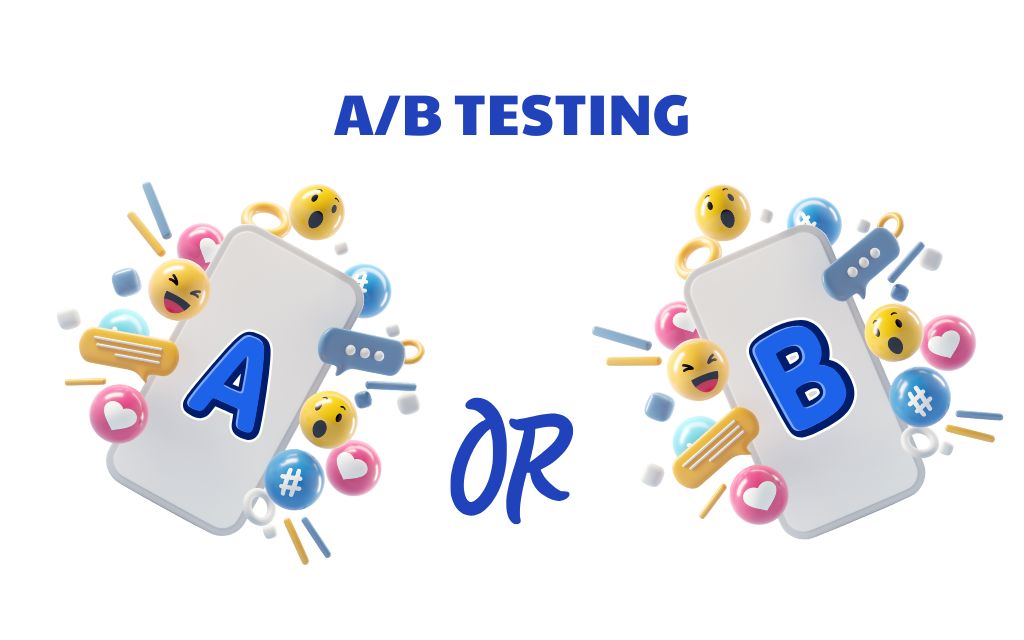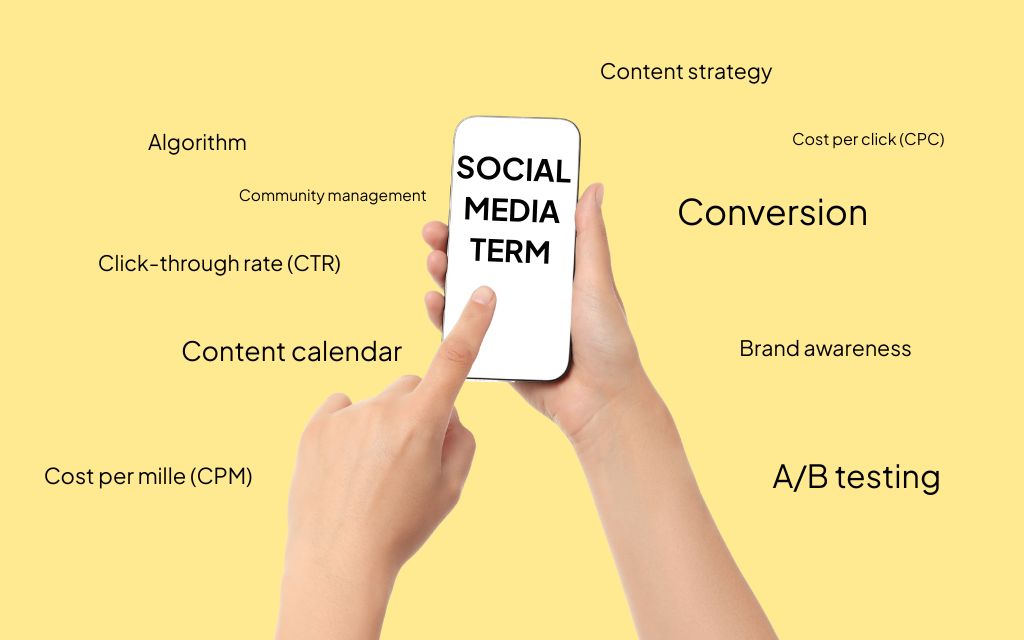Facebook remains the world’s most powerful advertising platform for small businesses and for good reason. With over 3 billion monthly active users, Facebook social media ads deliver measurable results even with limited budgets.
For Denver-area entrepreneurs and marketers, facebook social media ads represent the most cost-effective path to local growth. The average cost of Facebook advertising is $0.26 – $0.30 per click and $1.01 – $3.00 per 1000 impressions, making it significantly more affordable than other platforms.
This comprehensive guide reveals everything you need to master Facebook advertising, from foundational setup to advanced optimization strategies specifically designed for Denver businesses.
What are Facebook social media ads?
Facebook social media ads are paid promotions distributed across Facebook, Instagram, Messenger, and the Meta Audience Network.
These advertisements allow businesses to target audiences based on demographics, interests, behaviors, and geographic location – capabilities that organic posts simply cannot match.
Facebook reached 3.07 billion users in January 2025, one of the world’s most active social media platforms. This massive reach creates unparalleled opportunities for Denver businesses to connect with both local customers and broader markets.
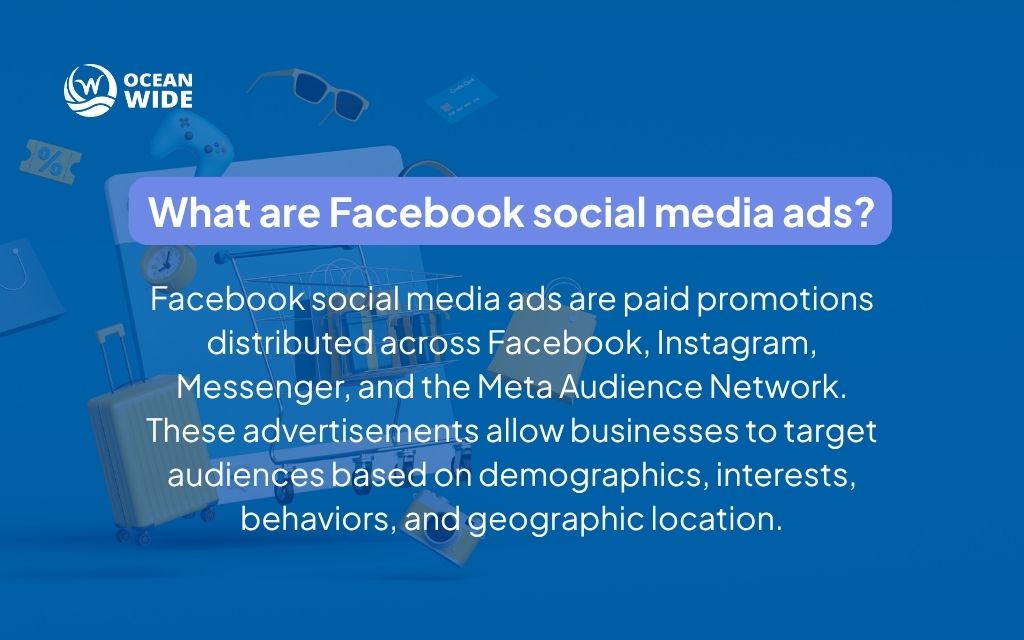
Why Facebook ads matter for Denver businesses
Hyper-local targeting capabilities
Denver businesses can leverage Facebook’s geographic targeting to reach customers within specific neighborhoods like Capitol Hill, Cherry Creek, LoDo, or Highlands.
Advanced radius targeting allows you to focus on users within 5, 10, or 25 miles of your business location, ensuring your ad spend reaches genuinely local prospects.
You can target Denver residents based on age, income level, interests, life events, and even behaviors like frequent dining out or outdoor activities.
Budget-friendly entry point
Facebook advertising starts with daily budgets as low as $1 per day, making it accessible for startups and small businesses. The average cost per lead across all industries is $27.66, substantially lower than Google Ads at $70.11 in 2025.
This affordability factor proves crucial for Denver’s entrepreneurial ecosystem, where many businesses operate with tight marketing budgets but need to compete effectively against larger regional and national competitors.
Proven return on investment
Businesses can expect ROI ranging from 400% to 500% on good Facebook advertising, with variations based on industry, target audience accuracy, and ad quality. These performance metrics translate into real business growth for Denver companies.
Multi-platform integration
A single Facebook campaign automatically extends across Instagram, Messenger, and the broader Meta network without additional setup or costs. This cross-platform reach maximizes your visibility while simplifying campaign management.
Over 70% of Facebook users utilize other popular apps like YouTube, TikTok, or Twitter, meaning your Facebook advertising strategy complements broader digital marketing efforts rather than competing with them.
Facebook ad objectives and campaign types
Awareness campaigns
Brand awareness and reach objectives focus on introducing your business to new Denver audiences. These campaigns work best for:
- New businesses
- Established companies launching new services
- Seasonal promotions targeting specific areas
- Building recognition before major sales campaigns
Awareness campaigns typically achieve lower cost-per-impression rates, making them ideal for businesses prioritizing market penetration over immediate conversions.
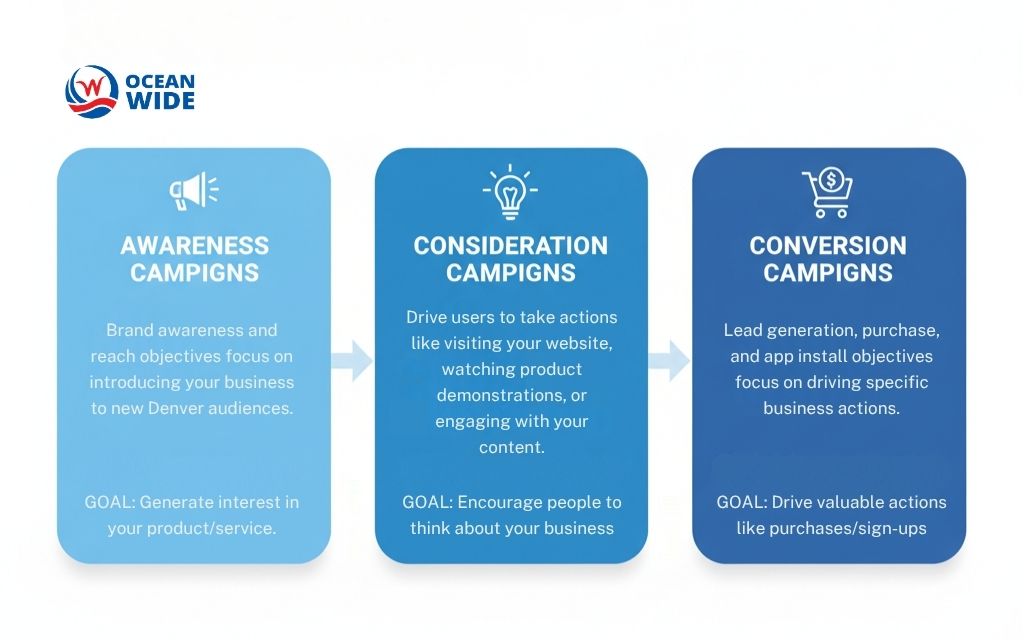
Consideration campaigns
Traffic, engagement, and video view objectives drive users to take preliminary actions like visiting your website, watching product demonstrations, or engaging with your content. These campaigns excel for:
- E-commerce stores showcasing new products
- Restaurants promoting seasonal menus
- Service providers educating prospects about solutions
- Event promotions requiring early awareness building
Conversion campaigns
Lead generation, purchase, and app install objectives focus on driving specific business actions. These campaigns deliver the highest return for:
- Service providers seeking consultation requests
- Online retailers driving immediate sales
- Local businesses collecting customer information
- B2B companies generating qualified leads
Types of Facebook social ads
Image ads
Single-image advertisements feature clean visuals with concise, compelling copy. These ads work effectively for simple offers, announcements, or product showcases. Best practices include using high-quality photography, minimal text overlay, and clear value propositions.
Denver businesses find success with image ads when showcasing local landmarks, featuring team members, or highlighting unique selling propositions that differentiate them from competitors.
Video ads
Video content dominates Facebook engagement, with 40% of all platform time dedicated to watching videos. Facebook videos are viewed 8 billion times per day. Video ads excel at storytelling, product demonstrations, and building emotional connections with audiences.
Vertical reels with audio have a 35% higher click-through rate than other video content. This format resonates with mobile users, who represent the majority of Facebook’s audience.
Carousel ads
Multi-image carousel formats allow businesses to showcase multiple products, services, or benefits within a single advertisement.
Each carousel card can feature unique images, headlines, and destination links, maximizing the information conveyed without overwhelming users.
Denver retailers use carousel ads to showcase product collections, restaurants highlight menu variety, and service providers demonstrate different solution categories.
Stories and reels ads
Stories are viewed by 500 million users each day, creating premium real estate for full-screen mobile advertising. These immersive formats capture attention through vertical video content, interactive elements, and immediate call-to-action opportunities.
Stories ads work well for time-sensitive offers, behind-the-scenes content, and building authentic connections with local audiences.
Collection and catalog ads
Dynamic product ads automatically showcase relevant items from your inventory based on user behavior and interests. These ads prove invaluable for e-commerce businesses with extensive product catalogs or frequently changing inventory.
Local Denver businesses use collection ads to promote seasonal offerings, highlight bestselling items, and create curated shopping experiences that drive both online and in-store traffic.
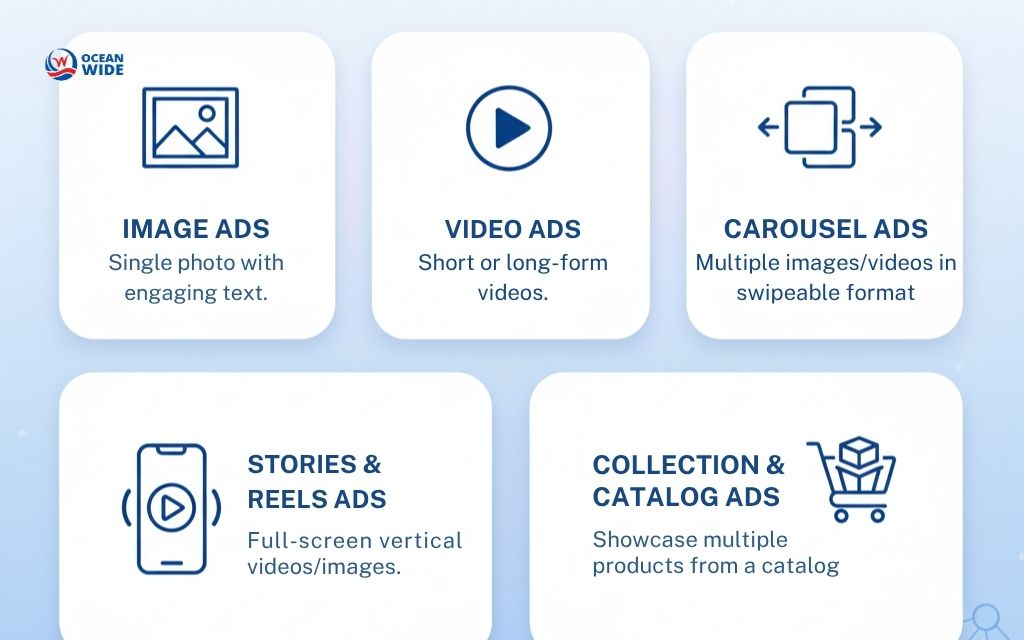
Step-by-step Facebook ads setup
Step 1: Accessing meta ads manager
Navigate to facebook.com/adsmanager and connect your business page to the advertising platform. Link your preferred payment method and verify your business information to ensure smooth campaign launches.
Denver businesses should also install the Meta Business Suite mobile app for convenient campaign monitoring and quick optimizations while away from their computers.
Step 2: Choosing campaign objectives
Select objectives that align with your specific business goals rather than focusing solely on lowest-cost options. Each objective optimizes Facebook’s algorithm differently, affecting both costs and results quality.
New businesses should start with awareness or traffic objectives before progressing to conversion-focused campaigns as they build audience data and refine targeting strategies.
Step 3: Audience definition and targeting
Geographic targeting forms the foundation of successful Denver advertising campaigns. Start with city-wide targeting before narrowing to specific neighborhoods or radius distances based on your service area.
- Custom audiences allow you to target existing customers, website visitors, or email subscribers.
- Lookalike audiences help you find new prospects who share characteristics with your best customers, expanding reach while maintaining relevance.
Facebook’s algorithm delivers ads to users most likely to take your desired action, but providing quality audience data improves optimization significantly.
Step 4: Creative development
High-performing Facebook ads feature authentic visuals that resonate with local audiences.
Denver businesses succeed by incorporating recognizable local elements, featuring real customers or team members, and maintaining consistent brand presentation across all creatives.
Keep text minimal and focused on clear value propositions. Adding call-to-action buttons can increase conversion rates by 2.85x according to performance benchmarks.
Step 5: Budget and schedule configuration
Start with daily budgets of $10 – $20 for testing, allowing campaigns to run for at least 5 – 7 days before making significant adjustments. This timeframe allows Facebook’s algorithm to complete its learning phase and stabilize performance.
Businesses often achieve better results by spreading budgets across multiple ad sets rather than concentrating spend in single campaigns, enabling more comprehensive audience testing.
Step 6: Performance monitoring and optimization
Track key metrics including click-through rate, cost per click, and conversion rates through Meta Ads Manager. Install the Meta Pixel on your website to measure conversions accurately and enable sophisticated retargeting capabilities.
Monitor performance daily during the first week, then adjust to weekly reviews as campaigns stabilize. Focus on metrics that align with your business objectives rather than vanity metrics like reach or impressions.

Advanced Facebook advertising strategies
Retargeting campaign implementation
Retargeting represents one of Facebook advertising’s most powerful capabilities. These campaigns re-engage users who previously interacted with your business but haven’t completed desired actions.
Website retargeting can achieve 2-3x higher conversion rates than cold audience campaigns while maintaining lower costs per acquisition.
Lookalike audience development
Lookalike audiences help you find new customers who resemble your best-performing audience segments. Set similarity percentages between 1 – 5% to balance precision with reach potential.
Create lookalike audiences based on your highest-value customers, most engaged email subscribers, or users who complete specific website actions. This approach scales successful targeting patterns to new prospect groups.
Systematic A/B testing
Test different ad elements systematically to identify winning combinations. Focus on testing one variable at a time – images, headlines, audience segments, or call-to-action buttons – to isolate performance factors clearly.
Seasonal campaign alignment
Denver’s distinct seasonal patterns create unique advertising opportunities. Leverage local events like ski season, summer festival calendars, Broncos games, or holiday shopping periods to align campaigns with heightened consumer interest.
Create seasonal ads creative that reflects current Denver experiences like snow-covered landscapes in winter, outdoor activities in summer, or fall foliage during autumn months.
Cross-platform integration strategy
Combine Facebook advertising with Instagram campaigns for unified brand presence across Meta’s platforms. Use Facebook for detailed storytelling and Instagram for visual impact, ensuring consistent messaging while optimizing for each platform’s strengths.
Integrate retargeting through Messenger for personalized follow-up conversations, creating multiple touchpoints that guide prospects through your sales process.
Measuring success: Essential Facebook ad metrics
Click-through rate (CTR)
The average CTR for Facebook ads is 1.71% in 2025, up from 1.57% the previous year. This metric indicates how effectively your ads capture audience attention and generate initial interest.
Cost per click (CPC)
The average cost per click for Facebook ads is $0.77. This improvement reflects Facebook’s advancing optimization algorithms and increased advertiser sophistication.
Conversion rate (CVR)
The average conversion rate for Facebook ads across industries is 8.95%, ranging from 2.31% to 14.29% depending on the industry. This metric directly reflects your ads’ ability to drive meaningful business actions.
Return on ad spend (ROAS)
Analysis of over 3,000 accounts shows an average ROAS of 2.98 across all industries. This means businesses typically generate $2.98 in revenue for every $1 spent on Facebook advertising.
ROAS varies significantly by industry, business model, and campaign optimization level. E-commerce businesses often achieve higher ROAS than service providers due to immediate transaction capabilities.
Cost per acquisition (CPA)
The average cost per acquisition across all industries can range from $20 to $80, though this varies substantially based on product value, sales cycle length, and target audience characteristics.
Frequency and reach metrics
Monitor ad frequency to prevent audience fatigue while maximizing reach efficiency. Frequency above 3-4 often indicates diminishing returns and potential negative user experiences.
Balance reach and frequency based on campaign objectives – awareness campaigns benefit from broader reach, while conversion campaigns often perform better with higher frequency among smaller, more targeted audiences.

Best practices for Denver Facebook advertising success
Local market understanding
Incorporate Denver-specific cultural references, seasonal patterns, and community events into advertising messaging. Highlight connections to local neighborhoods, sports teams, outdoor activities, and regional business networks.
Reference local landmarks, weather patterns, or community events to demonstrate genuine local presence and understanding.
Mobile-first creative development
98.5% of Facebook users access the platform on mobile devices, making mobile optimization non-negotiable. Design ads for vertical viewing, ensure text remains readable on small screens, and minimize load times.
Test all creative elements on actual mobile devices before campaign launches to identify potential user experience issues.
Community engagement integration
Leverage Facebook Groups and local community pages to build organic relationships alongside paid advertising efforts. 1.8 billion people use Facebook Groups each month, with over half belonging to five or more groups.
Participate authentically in Denver business groups, neighborhood associations, and interest-based communities to establish credibility before promoting services.
Seasonal budget planning
Plan advertising budgets around Denver’s seasonal business patterns, tourist seasons, and major local events. Increase spend during peak demand periods while maintaining year-round presence for consistent brand building.
Adjust creative messaging to reflect current seasonal experiences — highlighting indoor services during winter months or outdoor offerings during Colorado’s prime hiking and skiing seasons.
Landing page optimization
Ensure every Facebook ad directs users to relevant, mobile-optimized landing pages that continue the advertising message seamlessly. Each campaign should direct traffic to dedicated landing pages tailored specifically for that campaign.
Include local phone numbers, Denver addresses, and regional references on landing pages to reinforce local credibility and improve conversion rates.
Conclusion
Facebook social media ads give Denver businesses a proven path to connect with local audiences, boost visibility, and grow revenue – even with limited budgets. Success comes from understanding your Denver market, creating compelling content, and optimizing based on performance data.
The Ocean Wide – Your Facebook Social Media Ads Partner
At The Ocean Wide, we help Denver businesses create Facebook social media ads that deliver real ROI. From setup to optimization, we turn your ad spend into profitable customer growth.
Whether you’re starting your first campaign or improving existing ads, we guide you from confusion to consistent results with data-driven facebook paid social strategies.
Ready to grow your Denver business?
Phone: (720) 334-0899
Email: [email protected] | [email protected]
Frequently asked questions (FAQs)
How much should a small business spend on Facebook ads?
Start with $300-$500 monthly to test campaigns and identify successful audiences. Scale spend based on proven results and business capacity.
Mất bao lâu để thấy được kết quả?
Most campaigns show performance data within 7 – 14 days after Facebook’s learning phase. Optimal results typically require 30 – 60 days of testing and optimization.
Are Facebook ads still worth it in 2025?
Yes — with 3 billion users and average ROAS of 2.98, Facebook remains a top-performing platform for small businesses.
Can I target only Denver customers?
Absolutely. Use geo-targeting for specific Denver neighborhoods, radius targeting around your location, and demographic filters for local audiences.
What’s the difference between boosting posts and running ads?
Boosted posts offer basic promotion with limited options. Ads provide advanced targeting, detailed analytics, and better ROI measurement tools.
